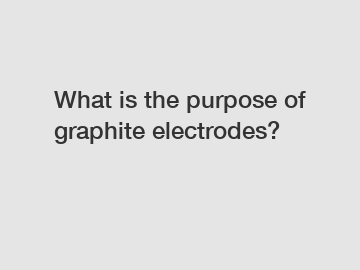What is the purpose of graphite electrodes?
What is the purpose of graphite electrodes?
Graphite electrodes are essential components used in various industrial applications, from steel manufacturing to silicon production. These electrodes offer unique characteristics that make them ideal for specific processes, ensuring efficiency, durability, and cost-effectiveness. In this article, we will delve into the purpose of graphite electrodes, exploring their key functions and benefits.
Conductivity: Enabling efficient energy transfer.

Graphite electrodes possess excellent electrical conductivity, allowing them to carry high currents needed for various industrial processes. The electrodes serve as conductive paths, transferring electrical energy to the specific material being processed. Due to their low electrical resistance, they efficiently deliver electricity, facilitating optimal heating, melting, or chemical reactions.
High-temperature resistance: Withstanding extreme conditions.
Another crucial function of graphite electrodes is their ability to withstand extremely high temperatures. During industrial operations like electric arc furnaces (EAF) or electric resistance furnaces, electrodes are exposed to intense heat, reaching up to 3,000 degrees Celsius. Graphite's high-temperature resistance ensures that the electrodes remain structurally stable, maintaining their shape and performance even under extreme conditions.
Chemical stability: Ensuring prolonged electrode life.
Graphite electrodes exhibit exceptional chemical stability, making them resistant to the corrosive effects of the materials they come into contact with during use. This durability ensures an extended lifespan for the electrodes, reducing the frequency of replacements and thus minimizing costs. Moreover, graphite electrodes can resist oxidation, which is crucial when they are used in processes involving oxygen or other reactive elements.
Mechanical strength: Providing structural reliability.
The mechanical strength of graphite electrodes is an important characteristic for their successful application. These electrodes must withstand significant mechanical stress during operations such as electrode handling or piercing furnace doors. Graphite's excellent mechanical properties enable electrodes to endure these challenges, ensuring their structural reliability and preventing breakage or damage during use.
Melting and alloying: Facilitating metal production.
In the steel industry, graphite electrodes play a vital role in the melting and alloying processes. During electric arc furnaces, the high electrical current passing through the electrodes generates intense heat, melting scrap metal or other raw materials to produce steel. Additionally, graphite electrodes are essential for alloying, where different metal materials are mixed to achieve desired properties. The electrodes enable precise temperature control, ensuring optimal alloying conditions and consistent quality in the final product.
Silicon production: Supporting the photovoltaic industry.
Graphite electrodes are also crucial in the manufacturing of silicon, particularly in the photovoltaic industry. In the production of polycrystalline silicon, a key material used in solar panels, graphite electrodes are used to heat and melt raw silicon. These electrodes provide high thermal efficiency, enabling precise temperature control necessary for obtaining high-purity silicon crystals. Without graphite electrodes, the production of photovoltaic materials would be significantly challenging and less cost-effective.
In conclusion, graphite electrodes serve essential functions across various industries. Their outstanding electrical conductivity, heat resistance, chemical stability, and mechanical strength make them ideal for numerous processes, including metal melting, alloying, and silicon production. By enabling efficient energy transfer, maintaining structural reliability, and facilitating precise temperature control, graphite electrodes contribute to the overall efficiency and cost-effectiveness of industrial operations.
If you have any questions or need further information about graphite electrodes, please do not hesitate to contact us.
Are you interested in learning more about 500mm UHP Graphite Electrode Features, 500mm UHP Graphite Electrode Features, 500mm UHP Graphite Electrode Features? Contact us today to secure an expert consultation!
130
0
0


Comments
All Comments (0)